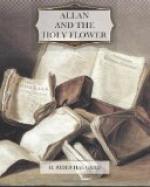I confess that I, too, felt compunction at abandoning them thus, but what could we do? I only trust that no harm came to them, but of course we never heard anything as to their fate.
On the further side of the lake we hid away the canoe in the bushes where we had found it, and began our march. Stephen and Mavovo, being the two strongest among us, now carried the plant, and although Stephen never murmured at its weight, how the Zulu did swear after the first few hours! I could fill a page with his objurgations at what he considered an act of insanity, and if I had space, should like to do so, for really some of them were most amusing. Had it not been for his friendship for Stephen I think that he would have thrown it down.
We crossed the Garden of the god, where Mrs. Eversley told me the Kalubi must scatter the sacred seed twice a year, thus confirming the story that we had heard. It seems that it was then, as he made his long journey through the forest, that the treacherous and horrid brute which we had killed, would attack the priest of whom it had grown weary. But, and this shows the animal’s cunning, the onslaught always took place after he had sown the seed which would in due season produce the food it ate. Our Kalubi, it is true, was killed before we had reached the Garden, which seems an exception to the rule. Perhaps, however, the gorilla knew that his object in visiting it was not to provide for its needs. Or perhaps our presence excited it to immediate action.
Who can analyse the motives of a gorilla?
These attacks were generally spread over a year and a half. On the first occasion the god which always accompanied the priest to the garden and back again, would show animosity by roaring at him. On the second he would seize his hand and bite off one of the fingers, as happened to our Kalubi, a wound that generally caused death from blood poisoning. If, however, the priest survived, on the third visit it killed him, for the most part by crushing his head in its mighty jaws. When making these visits the Kalubi was accompanied by certain dedicated youths, some of whom the god always put to death. Those who had made the journey six times without molestation were selected for further special trials, until at last only two remained who were declared to have “passed” or “been accepted by” the god. These youths were treated with great honour, as in the instance of Komba and on the destruction of the Kalubi, one of them took his office, which he generally filled without much accident, for a minimum of ten years, and perhaps much longer.
Mrs. Eversley knew nothing of the sacramental eating of the remains of the Kalubi, or of the final burial of his bones in the wooden coffins that we had seen, for such things, although they undoubtedly happened, were kept from her. She added, that each of the three Kalubis whom she had known, ultimately went almost mad through terror at his approaching end, especially after the preliminary roarings and the biting off of the finger. In truth uneasy lay the head that wore a crown in Pongo-land, a crown that, mind you, might not be refused upon pain of death by torture. Personally, I can imagine nothing more terrible than the haunted existence of these poor kings whose pomp and power must terminate in such a fashion.




